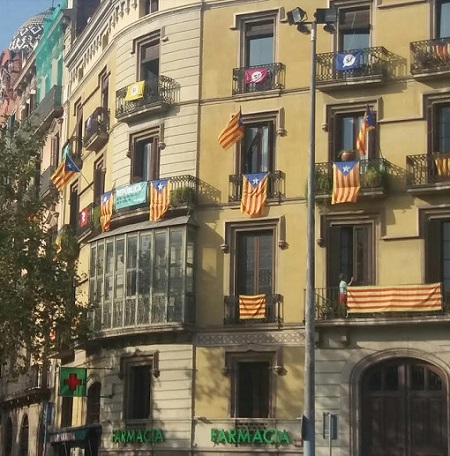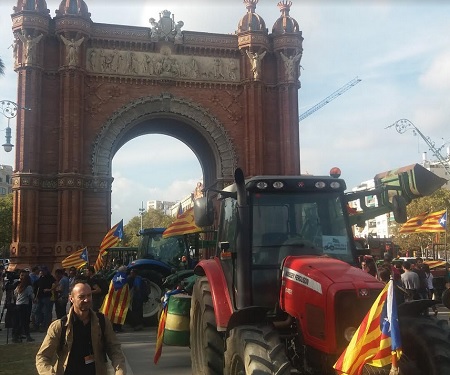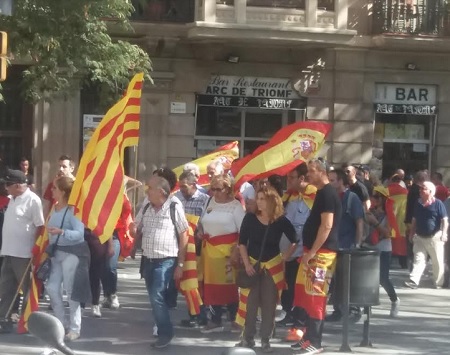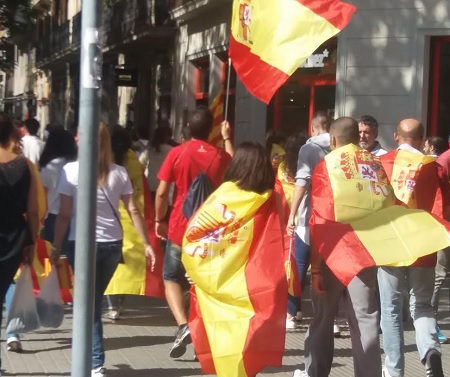As readers in Spain know, Catalonia’s regional president Carles Puigdemont again tried a long-shot gambit to resolve the standoff over Catalonia’s bid for independence. He again asked Spain to enter into negotiations over the region’s autonomy, this time with the attention-getting ploy of joining with secessionist leaders to sign a declaration of independence, but then suspending it for a few weeks to allow for negotiations with Spain.
Spanish prime minister Mariano Rajoy promptly rejected the idea, first demanding a response as to whether Catalonia considered itself to be independent, then setting a deadline for an answer of 10:00 AM Monday. If Puigdemont says that Catalonia is independent, the Spanish government has given it another three days to reverse the declaration. Bloomberg reports that Catalonia’s government will ignore the demand.
As we pointed out, later in the week the press reported on what looked to be a planted story, that a team of members of Rajoy’s party and the opposition were looking at Constitutional reform, in particular, tidying up provisions relating to regional autonomy. We though this might be a public relations move to further isolate the separatists, in that they could be presented as proceeding recklessly when their issues were conceivably be about to be addressed. Our readers dismissed this idea as not even rising to the level of being a trial balloon, although I would not underestimate the possibility of the press in other countries taking this story up if the confrontation in Catalonia escalates.
If Rajoy takes action when the separatists haven’t taken a concrete step, he risks again looking trigger-happy, as he did with his overly heavy-handed crackdown on the referendum, when over 850 people were injured. It would seem better for him to resist his impulses to act, and at most make a statement, directly or through operatives, calling the separatists’ bluff. If they aren’t willing to say they are independent, then they have accepted the status quo, and Spain could even depict that as a mature response. But if they change their minds, the central government will take action as needed.
In the meantime, Catalonia is on a knife edge, as Don Quijones reports below.
By Don Quijones of Spain, the UK, and Mexico and editor at Wolf Street. Originally published at Wolf Street
In Catalonia the economy is already beginning to feel the pinch from the rise in political tensions, as tourist numbers plunge 20% to 30% and as hundreds of companies, both domestic and foreign, move their headquarters to other parts of Spain, albeit in most cases only on paper.
But there’s one business that’s doing a brisk trade: the flag business.
Wherever you go these days, flags are everywhere. For years the estelada flag, the starry symbol of Catalan independence, has been a ubiquitous feature of the urban landscape. But now the Spanish flag is doing its best to catch up. As Catalonia’s separatist movement grows in confidence, more and more balconies in Madrid, Valencia, Seville and other Spanish cities, including even Barcelona, are sporting the bold red and yellow of the Spanish flag.
I took these photos in Barcelona. The estelada draped from windows and balconies:

And the estelada on tractors:

Here’s a mix of Catalan national flag (and former flag of the Crown of Aragon), the Senyera, and the Spanish flag:

And mostly Spanish flags:

The Chinese are happy to manufacture these flags. And the Pakistanis, Indians and Bangladeshis that run many of Spain’s convenience stores are happy to sell them. As the Catalans are fond of saying, pela és pela (money is money).
While all this frenetic flag buying, selling, waving and draping may be good business for some, it points to a very dark reality for Spanish and Catalan society: two deeply rooted, diametrically opposed forms of nationalism with a bleak not-so-distant past are on the verge of a head-on clash. While much of the focus of the international media has been on divisions between Spain and Catalonia, it’s within Catalonia itself that the most toxic effects of this political crisis are being felt.
Communities within the region are fracturing, families are splintering and friendships are breaking apart as the politics of sectarianism worm their way into just about every public and private space.
Stress levels are rising and many people are struggling to sleep. A friend of mine told me last week that the morning after the violence-marred referendum on Oct.1, two colleagues at the office where she works, belonging to a company whose management is fiercely unionist, were entrusted with the unpleasant task of finding out where all the other junior employees’ loyalties lie.
“On the side of dialogue” was my friend’s improvised response.
The pressures to conform are at times unbearable. The wife of a close friend complained at the weekend that she had been strongly criticized by her work colleagues for not taking part in last Tuesday’s general strike. If there’s another strike she’ll probably stay at home, if only to avoid the accusatory glares of her fellow colleagues.
Another friend, of Spanish-German descent, was interviewed by a German newspaper about his feelings over recent developments in Catalonia. Having suffered serious setbacks in his work as sales manager for a German chemicals company and facing the possibility of having to move to Madrid as a direct result of the political chaos in Catalonia, my friend was pretty candid about the chaos it’s causing.
But when the journalist sent him the final copy of the article, he saw that she had featured his full name and the name of the company he works for. “You can’t do that,” he told her. “I could lose my job. My company could lose all its contracts with local government institutions. I could even be blacklisted.” In the end the journalist agreed to remove all mention of my friend and his business from the article.
That more or less sums up the bleak reality that has descended on Catalonia, a place where it’s becoming increasingly difficult to express your opinions freely and openly without paying a high price. The fact that this is happening in a country where the roots of democracy are still fairly shallow should give pause for thought. By Don Quijones.
Hopes that Catalonia’s woes could be contained are fading. Read… Catalonia Crisis Far From Over Despite Market Surge
Update 5:30 AM: As anticipated, Puigdemont punted. From the Financial Times:
But in a letter seen by the FT on Monday, Mr Puigdemont defied calls by the Spanish government to provide a yes-or-no answer, saying that the declaration was “in suspension,” while calling for talks.
“Our offer for dialogue is sincere and honest,” he wrote. “During the next two months, our main objective is to have this dialogue and that all international, Spanish and Catalan institutions and personalities that have expressed the willingness to open a way for dialogue can explore it.”


One minor quibble with respect to “And the Pakistanis, Indians and Bangladeshis that run many of Spain’s convenience stores are happy to sell them.” This may be correct locally in Barcelona, but in the rest of Spain it is not. According to the INE, Spain has about 135,000 residents who come from Pakistan, India and Bangladesh. They are heavily concentrated in Catalunya. More than half of this population lives in Catalunya, more than two thirds in Catalunya or Valencia. For comparison, there are around 10,000 from this population living in Madrid (heavily concentrated in certain neighborhoods). There are more than 200,000 Chinese living in Spain, but more evenly distributed (about a quarter of them live in Madrid, about a quarter in Catalunya). In the Spanish mind it is the Chinese who are the immigrants who run convenience/five-and-dime stores, so much so that such stores are commonly called “chinos” (the stores themselves are called this way as in “he bajado al chino para comprar una disfraz de Halloween”) even by people like university professors who are putatively sensitive to this sort of usage.
It is, however, true, that these stores are all selling flags right now, that flags are draped from windows all around (it reminds me of the US post 9/11), and that the most toxic sort of nationalistic chauvinism is increasingly out in the open. Images of Barcelona fans at Atletico’s stadium wearing Messi jerseys and Spanish flags over them speak volumes.
Thanks for the correction, Dan. I didn’t realize just how concentrated the Pakistani and Indian population is in Catalonia. In my neighbourhood it was mainly Pakistani and Bangladeshi-owned convenience stores selling the flags, although a few Chinese-owned shops were also in on the trade.
Yves, there’s one little amendment needed to the text: the heading for the third photo down should read:
Here’s a mix of the Catalan national flag (and former flag of the Crown of Aragon), the Senyera, and the Spanish flag
The answer has been given by Puigdemont and they are not gonna like it in Madrid, so now the Spanish state has to react before its new deadline of Thursday: will it categorically suspend Catalonia’s autonomy, and if it does so, will it be able to enforce this suppression of autonomic powers?
Does anyone know where the Mossos chief and other Catalonian officials are located – that is, are they actually in the Spanish gov’t’s custody? That might tell us a lot.
As of today, the two most prominent Catalan civil leaders are in a Spanish prison in Madrid accused of sedition, the Mossos chief’s passport has been confiscated by the Spanish state and he has to sign every fortnight in a Catalonian court, Catalonian gov’t officials are still carrying out their duties in Catalonya.
Current news, on Al Jazeera (sorry no link, it’s a video on Google News), is that Spain has deferred the deadline to Thursday.
Cold feet on both sides? It’s good news, of a sort.
No cold feet. The two top civic and community Catalan secessionist organizers have been jailed, bail denied